反意疑问句
汉语反义疑问句

汉语反义疑问句
1. 汉语反义疑问句可有意思啦,就像一场语言的小冒险!比如说,“你今天没吃饭,对吧?”,这不是很有趣嘛!
2. 汉语反义疑问句啊,那简直是日常交流中的小精灵!像“这电影好看,不是吗?”,多自然的表达呀!
3. 哇哦,汉语反义疑问句,不就是让对话变得更生动的魔法嘛!“你会来参加聚会,对不对?”,是不是感觉很亲切呢!
4. 汉语反义疑问句,那可是能瞬间拉近人与人距离的法宝呀!“他挺厉害的,是不是呀?”,这样一说就感觉亲近多了。
5. 嘿,汉语反义疑问句,就如同给语言加点调料!“这件衣服很适合你,对吧?”,多有意思呀。
6. 汉语反义疑问句,简直是让话语活起来的妙招!“你知道答案的,不是吗?”,能引发好多互动呢。
7. 哎呀呀,汉语反义疑问句,那是让聊天更精彩的秘诀!“她唱歌好听,对不对?”,让人很有聊下去的欲望呢。
8. 汉语反义疑问句,不就是话语中的小惊喜嘛!“你已经准备好了,对吧?”,让交流充满期待。
9. 哇,汉语反义疑问句,这可是让表达更丰富的好东西!“那地方不远,不是吗?”,简单又好用。
10. 汉语反义疑问句,绝对是语言世界里的好玩意儿!“你不会忘了我,对吧?”,让人心里暖暖的。
我的观点结论:汉语反义疑问句在日常交流中有着独特的魅力和重要的作用,它能让对话更丰富、更有趣、更有情感。
反义疑问句
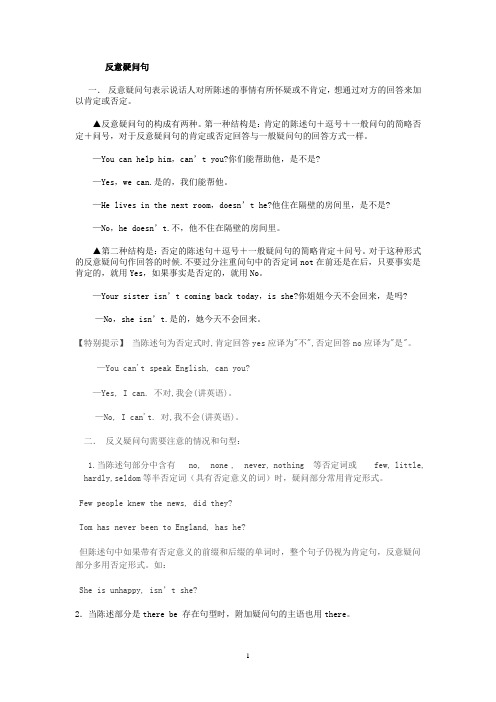
反意疑问句一.反意疑问句表示说话人对所陈述的事情有所怀疑或不肯定,想通过对方的回答来加以肯定或否定。
▲反意疑问句的构成有两种。
第一种结构是:肯定的陈述句+逗号+一般问句的简略否定+问号,对于反意疑问句的肯定或否定回答与一般疑问句的回答方式一样。
—You can help him,can’t you?你们能帮助他,是不是?—Yes,we can.是的,我们能帮他。
—He lives in the next room,doesn’t he?他住在隔壁的房间里,是不是?—No,he doesn’t.不,他不住在隔壁的房间里。
▲第二种结构是:否定的陈述句+逗号+一般疑问句的简略肯定+问号。
对于这种形式的反意疑问句作回答的时候.不要过分注重问句中的否定词not在前还是在后,只要事实是肯定的,就用Yes,如果事实是否定的,就用No。
—Your sister isn’t coming back today,is she?你姐姐今天不会回来,是吗?—No,she isn’t.是的,她今天不会回来。
【特别提示】当陈述句为否定式时,肯定回答yes应译为"不",否定回答no应译为"是"。
—You can't speak English, can you?—Yes, I can. 不对,我会(讲英语)。
—No, I can't. 对,我不会(讲英语)。
二.反义疑问句需要注意的情况和句型:1.当陈述句部分中含有 no, none , never, nothing 等否定词或 few, little, hardly,seldom等半否定词(具有否定意义的词)时,疑问部分常用肯定形式。
Few people knew the news, did they?Tom has never been to England, has he?但陈述句中如果带有否定意义的前缀和后缀的单词时,整个句子仍视为肯定句,反意疑问部分多用否定形式。
反义疑问句
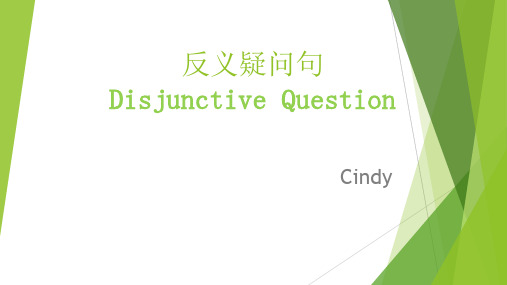
3.Clever girls need never work hard,
B?
A. needn’t they B.need they C.don’t they D.do they
反义疑问句填空。
1.You’d better have a good rest, hadn’t you
ቤተ መጻሕፍቲ ባይዱ
?
2.They have to go there,
(5)陈述部分有“have to/had to+v.”,疑问部分常用“don't/didn't +主语”。 如:We have to get there at eight tomorrow, don't we? (6)陈述部分的谓语是used to时,疑问部分用“didn't/usedn't+主语”。 如:He used to take pictures there, didn't/usedn't he? (7)陈述部分有“had better+v.”,疑问部分用“hadn't+主语”。 如:You'd better read it by yourself,hadn't you? (8)陈述部分有“would rather+v.”,疑问部分用“wouldn't+主语”。 如:He would rather read it ten times than recite it, wouldn't he?
什么是反意疑问句
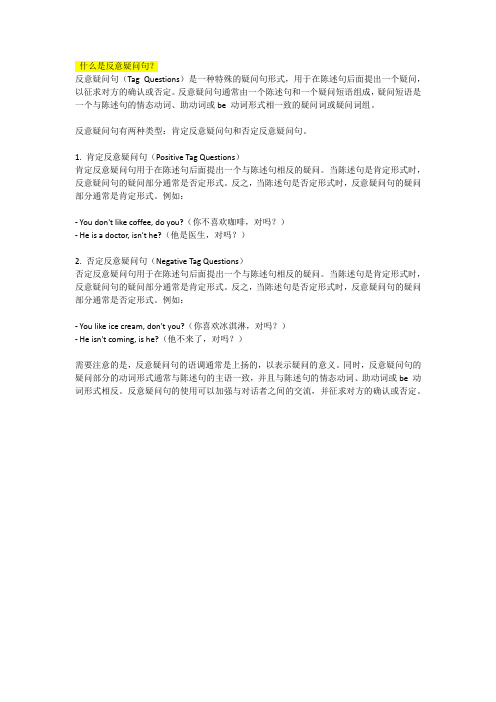
什么是反意疑问句?反意疑问句(Tag Questions)是一种特殊的疑问句形式,用于在陈述句后面提出一个疑问,以征求对方的确认或否定。
反意疑问句通常由一个陈述句和一个疑问短语组成,疑问短语是一个与陈述句的情态动词、助动词或be 动词形式相一致的疑问词或疑问词组。
反意疑问句有两种类型:肯定反意疑问句和否定反意疑问句。
1. 肯定反意疑问句(Positive Tag Questions)肯定反意疑问句用于在陈述句后面提出一个与陈述句相反的疑问。
当陈述句是肯定形式时,反意疑问句的疑问部分通常是否定形式。
反之,当陈述句是否定形式时,反意疑问句的疑问部分通常是肯定形式。
例如:- You don't like coffee, do you?(你不喜欢咖啡,对吗?)- He is a doctor, isn't he?(他是医生,对吗?)2. 否定反意疑问句(Negative Tag Questions)否定反意疑问句用于在陈述句后面提出一个与陈述句相反的疑问。
当陈述句是肯定形式时,反意疑问句的疑问部分通常是肯定形式。
反之,当陈述句是否定形式时,反意疑问句的疑问部分通常是否定形式。
例如:- You like ice cream, don't you?(你喜欢冰淇淋,对吗?)- He isn't coming, is he?(他不来了,对吗?)需要注意的是,反意疑问句的语调通常是上扬的,以表示疑问的意义。
同时,反意疑问句的疑问部分的动词形式通常与陈述句的主语一致,并且与陈述句的情态动词、助动词或be 动词形式相反。
反意疑问句的使用可以加强与对话者之间的交流,并征求对方的确认或否定。
反义疑问句
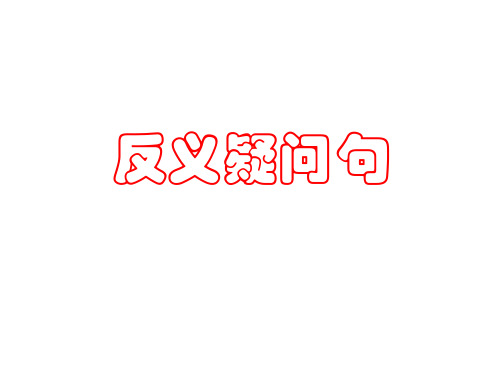
结构二: 前否,+ 后肯
陈述部分用 no, nothing, nobody, never, few, seldom, hardly, little等否定含义的词时,疑 问部分用肯定含义。例如: Some plants never blown (开花), do they ? 有些植物从不开花,对吗?
1. You are an actor, ___a_r_e_n_’t_ _y_o_u__ ? 2. He is a good boy, ___i_s_n_’t__ __h_e___ ? 3. It was fine yesterday, _w__a_s_n_’t_ _it__ ?
3
行为动词:助动词/情态动词的否定形式+
Let us ---------, will you ?或won't you ?(Let us 不包括谈话的对方在内)。。。
6. Sit down please, _w__il_l _/_w__o_n_’t_y_o_u__ ? 7. Let’s go home, __w_i_ll_/__w_o_n_’_t_y_o_u__ ? 8. Let us go home, _s_h_a_ll_/__sh__a_n_’t_w__e__
结构二: 前否,+ 后肯
1. You aren’t an actor, __a_r_e__yo_u___ ? 2. It wasn’t fine yesterday, _w__a_s __it__ ? 3. Don’t smoke, ___w__il_l_ y_o_u___ ? 4. You won’t go to USA, _w_i_ll___y_o_u__?
反义疑问句
反意疑问句是由一个陈述句加一个简短的反问
反意疑问句
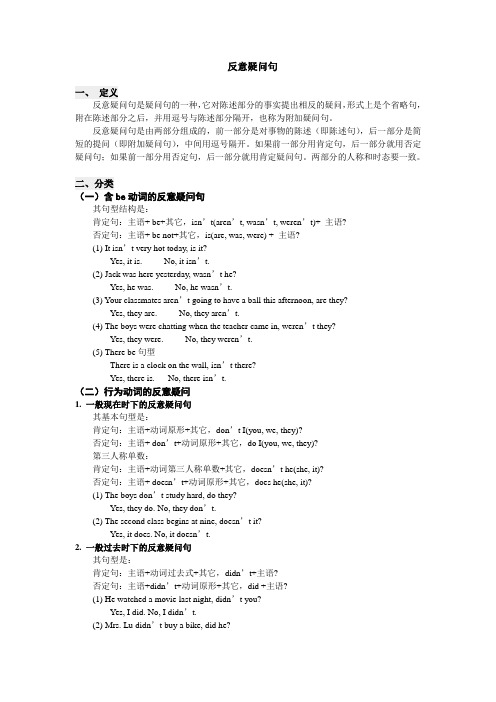
反意疑问句一、定义反意疑问句是疑问句的一种,它对陈述部分的事实提出相反的疑问,形式上是个省略句,附在陈述部分之后,并用逗号与陈述部分隔开,也称为附加疑问句。
反意疑问句是由两部分组成的,前一部分是对事物的陈述(即陈述句),后一部分是简短的提问(即附加疑问句),中间用逗号隔开。
如果前一部分用肯定句,后一部分就用否定疑问句;如果前一部分用否定句,后一部分就用肯定疑问句。
两部分的人称和时态要一致。
二、分类(一)含be动词的反意疑问句其句型结构是:肯定句:主语+ be+其它,isn’t(aren’t, wasn’t, weren’t)+ 主语?否定句:主语+ be not+其它,is(are, was, were) + 主语?(1) It isn’t very hot today, is it?Yes, it is.No, it isn’t.(2) Jack was here yesterday, wasn’t he?Yes, he was. No, he wasn’t.(3) Your classmates aren’t going to have a ball this afternoon, are they?Yes, they are.No, they aren’t.(4) The boys were chatting when the teacher came in, weren’t they?Yes, they were.No, they weren’t.(5) There be句型There is a clock on the wall, isn’t there?Yes, there is.No, there isn’t.(二)行为动词的反意疑问1. 一般现在时下的反意疑问句其基本句型是:肯定句:主语+动词原形+其它,don’t I(you, we, they)?否定句:主语+ don’t+动词原形+其它,do I(you, we, they)?第三人称单数:肯定句:主语+动词第三人称单数+其它,doesn’t he(she, it)?否定句:主语+ doesn’t+动词原形+其它,does he(she, it)?(1) The boys don’t study hard, do they?Yes, they do. No, they don’t.(2) The second class begins at nine, doesn’t it?Yes, it does. No, it doesn’t.2. 一般过去时下的反意疑问句其句型是:肯定句:主语+动词过去式+其它,didn’t+主语?否定句:主语+didn’t+动词原形+其它,did +主语?(1) He watched a movie last night, didn’t you?Yes, I did. No, I didn’t.(2) Mrs. Lu didn’t buy a bike, did he?Yes, he did. No, he didn’t.3. 一般将来时下的反意疑问句其句型是:肯定句:主语+will+动词原形+其它,won’t+主语?否定句:主语+ won’t +动词原形+其它,will +主语?(1) It won’t stop snowing, will it?Yes, it will. No, it won’t.③Mr. Johnson will visit our school next month, won’t he?Yes, he will. No, he won’t.4. 现在完成时下的反意疑问句其句型是:肯定句:主语+have+动词过去分词+其它,haven’t+主语?否定句:主语+ haven’t +动词过去分词+其它,have +主语?第三人称单数肯定句:主语+has+动词过去分词+其它,hasn’t+主语?否定句:主语+ hasn’t +动词过去分词+其它,has +主语?(1) You have been to the US before, haven’t you?Yes I have. No, I haven’t.(2) Jim hasn’t done his homework, has he?Yes, he has. No, he hasn’t.5. 含有情态动词的反意疑问句其句型是:肯定句:主语+情态动词+动词原形+其它,情态动词否定形式+主语?否定句:主语+情态动词否定形式+动词原形+其它,情态动词+主语?(1) You can speak French, can’t you?Yes, I can. No, I can’t.(2) Andy could swim when he was six, couldn’t he?Yes, he could. No, he couldn’t.(3) The students must study hard, mustn’t they?Yes, they must. No, they needn’t.三、反意疑问句应注意的问题1. 当陈述部分的主语是everybody, everyone, someone, nobody, somebody等不定代词时,反意疑问句部分中的主语常用they。
反义疑问句
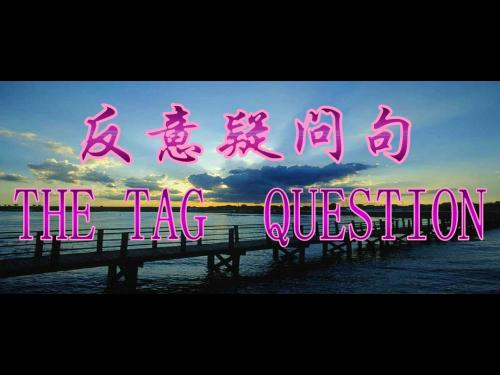
9.陈述部分的主语是I,疑问部 分要用 aren't I. I’m as tall as your sister, ____________? aren't I aren’t I I am a stude问 部分用will you。 will you Don't do that again, _________?
• Nothing is serious , _______ ?
Everyone is in the classroom, ___________?
Everything begins to grow in spring, __________?
Nobody will go, _________?
7.陈述部分有had better + v. 疑 问句部分用hadn't you?
3.陈述部分用 no, nothing, nobody, none,never, few, little, seldom(很少), hardly(几乎 不), 等否定含义的词时,疑问 部分用肯定含义。 Miss Swede made no answer, did she ___________? He can hardly understand it , ___________ ? can he
• He dislikes English, ___________? • You were careless , ___________? • He is unhappy, ___________?
5.主语为指人的不定代词 everyone、everybody、 someone、somebody、 anyone、anybody、no one、 nobody时,附加疑问句的主语 用 they/he .
反意疑问句

前否后肯
b. 否定的陈述部分 + __肯__定__的__疑__问__句___( __b__e_/_助__/情____ + 主语) ?
反意疑问句的陈述部分常用来表明说话人的观点及想法,再用简略的
问句来征求对方的意见;简略问句的构成与陈述部分的一般疑问句构
成相同;回答仍然用Yes, ... / No, …
__n_e_e__d_n_’_t____w_e_______?
2. 若陈述部分含有be动词,则用be动词构成简略问句。 1) You are from England, aren’t you? 2) She isn’t a teacher,___i_s__s_h__e_____? 3) They were playing basketball this time yesterday,
3. 若陈述部分含有行为动词,则用助动词构成简略问句。
1) They saw the movie, didn’t they?
2) Tom read books on English just now, didn’t he
_____________?
does she
3) She doesn’t like apples, _______________?
5. 若陈述部分句子为 think, believe, suppose, guess等引 导的从句, 主语为一人称, 并且主句为一般现在时态, 简略问句的 构成应以从句为准。 (主现看从句) 1) I don’t think you are right, are you? 2) I am sure he will come, __w__o_n_’_t___h_e_______? 3) We don’t believe he is from America, __is___h__e_____?
- 1、下载文档前请自行甄别文档内容的完整性,平台不提供额外的编辑、内容补充、找答案等附加服务。
- 2、"仅部分预览"的文档,不可在线预览部分如存在完整性等问题,可反馈申请退款(可完整预览的文档不适用该条件!)。
- 3、如文档侵犯您的权益,请联系客服反馈,我们会尽快为您处理(人工客服工作时间:9:00-18:30)。
反意疑问句反意疑问句反义疑问句又叫附加问句(tag question),跟在陈述句之后。
反义疑问句动词是助动词、情态动词和be 动词的某种形式,主语必须用代词。
要点归纳如下:1.在含有I am的陈述句之后,附加疑问句aren’t I .2.陈述句中含有must的反意疑问句:a.must表“必须”,附加疑问句可使用must/need.eg. They must clean the floor, mustn’t/ needn’t they?b.mustn’t 表示“不允许”“禁止”之意时, 可用must/may.eg We mustn’t be late, must/may we?c.must作“一定”表推测时,附加疑问句的助动词与must后面的动词相呼应.eg They must be playing outside, aren’t they?You must have heard about it, haven’t you?3.陈述句中含有助动词ought to, 附加疑问句可使用oughtn’t/shouldn’t.eg We ought to go now, shouldn’t we?We ought to go now, oughtn’t we?4.陈述句部分用have to, 附加疑问句应借助于助动词do.eg He has to get up at four tomorrow, doesn’t he?5.前句的谓语动词为used to 时, 其疑问部分可用didn’t /use(d)n’t.eg He used to live in London, use(d)n’t he/ didn’t he?6.当陈述部分有dare或need 时,若dare和need为实义动词,疑问部分用do的形式.若dare和need为情态动词,疑问部分用dare/need.eg We need to do it, don’t we?You daren’t go there, dare you?7.let’s 开头的句子其疑问部分用shall we?8.在含有宾语从句的复合句中:a.当主句的主语为第一人称,且主谓是I/We think/believe/suppose/imagine/guess/expect等及I’m sure时,附加疑问句中与从句的主谓一致.(此类结构有否定转移现象)eg I don’t think (that) chickens can swim,can they?I am sure (that) what they need is time,isn’t it?b.当主句的主语不是第一人称时,附加疑问部分与主句的主谓一致.eg He thinks it’s not a good idea,doesn’t h e?9.感叹句之后的疑问尾句只能用否定式.eg What a nice day, isn’t it?10.并列句式的反意疑问句与最接近的分句的主谓一致.eg We must start at once or we can’t get there on time, can we?He is a teacher but his wife isn’t a teacher, is she?11.当陈述部分含否定前缀时,反意疑问句仍用否定.eg It is unfair, isn’t it?Tom d islikes eating fish,doesn’t he?12.祈使句的反义疑问句常用will you 或won’t you(一般只用于肯定的祈使句)eg Don’t be late next time,will you?Let us have a rest,will/won’t you?13.当陈述部分的主语是指物的不定代词something,anything,nothing ,everything时,问句的主语用it;但如果是指人的somebody(someone),anybody(anyone), no- body(no one),everybody(everyone)时,问句的主语用he 或they,此时动词的数要一致。
eg Nothing has happened to them,has it?Everyone has done their besting the game,haven’t they?Somebody has taken the seat,hasn’t he?14.陈述部分是There/Here+be +主语时,问句部分用there/here.eg There are two cakes on the plate,aren’tthere?Here is a story about Mark Twin,isn’t here?效果检测一、单项选择(共20小题;共20分)1. She seldom thinks what her father says is right, ?A. does sheB. doesn't heC. doesn't sheD. is it2. Brian told you that there wasn't anyone in the room at that time, ?A. was thereB. wasn't thereC. didn't heD. did he3. It's the first time that he has been to Australia, ?A. isn't heB. hasn't heC. isn't itD. hasn't it4. When the accident happened, your brother escaped being hurt, ?A. didn't heB. did heC. didn't itD. did it5. He supposed that our basketball team won the championship in the competition lastnight, ?A. did heB. didn't heC. did itD. didn't it6. We forgot to bring our tickets, but please let us enter, ?A. do youB. can weC. will youD. shall we7. It's dark now. We have to stay here for the night, ?A. don't weB. haven't weC. mustn't weD. shouldn't we8. The students carrying books come in first, ?A. don't youB. don't theyC. will theyD. will you9. I don't suppose that our team will win the game, ?A. do IB. don't IC. will itD. won't it10. I don't think you are right, ?A. are youB. aren't youC. do ID. don't I11. --- Alice, you feed the bird today, ?--- But I fed it yesterday.A. do youB. will youC. didn't youD. don't you12. Her daughter had the carpets and curtains cleaned, ?A. had sheB. hadn't sheC. didn't sheD. did she13. Nothing has been reported about the international meeting, ?A. has itB. hasn't itC. has thereD. hasn't there14. I do believe that all the Senior 3 students in our school will do well in the coming college entranceexamination, ?A. will theyB. won't theyC. don't ID. do you15. Mrs. Black doesn't believe her son is able to design a digital camera, ?A. is heB. isn't heC. doesn't sheD. does she16. --- Didn't you pass the exam, Lin Tao?--- , or I couldn't have been scolded by my parents.A. Yes, I didB. No, I didn'tC. Yes, I didn'tD. No, I did17. --- Andy isn't going out this evening, is she?--- . She has to stay at home to look after her sick mother.A. Yes, she isB. No, she isn'tC. Yes, she isn'tD. No, she is18. --- Vivian was not a hardworking girl, was she?--- .A. Yes, but she wasn'tB. Yes, but she isC. No, but she isn'tD. No, but she is19. --- The novel isn't easy for Xiao Wang to read, is it?--- . His foreign language is far better than expected.A. No, it isn'tB. I'm afraid notC. I think soD. Yes, it is20. --- She isn't a dancing teacher, is she?--- .A. No, but she wasB. Yes, she isn'tC. Yes, she wasn'tD. No, she is二、单句改错(共10小题;共10分)21. I don't suppose anyone will come, won't they?22. I don't believe she knows it, do I?23. There is nothing in the bag, is it?24. He must have finished his homework so far, mustn't he?25. People can hardly do some fishing there, can't they?26. He hardly knew about it, didn't he?27. He dare not speak English before such a crowd, dare not he?28. I don't think he can be on time, can I?29. There is quite a bit of rain in your part of the country, isn't it?30. There is little milk in the glass, isn't there?答案一、单项选择1. A2. C3. C4. A5. B6. C7. A8. D9. C 10. A11. B 12. C 13. A 14. B 15. D16. B 17. B 18. D 19. D 20. A二、单句改错21. won't改为will 22. do I改为does she 23. is it改为is there24. mustn't改为hasn't 25. can't改为can 26. didn't改为did 27. 去掉第二个not 28. I 改为he 29. isn't it改为isn't there 30. isn't改为is。
